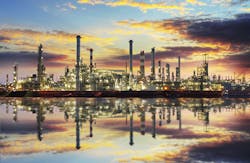ExxonMobil’s Rotterdam refinery to start producing higher-value products
ExxonMobil is to expand the hydrocracker unit at its Rotterdam refinery in the Netherlands so that the facility can upgrade heavier byproducts into cleaner, higher-value finished products.
The move comes in response to rising global market demand and follows similar projects at the company’s refineries in Texas and Singapore.
After the expansion, the Rotterdam refinery will produce EHC Group II base stocks and ultra-low sulfur diesel. According to ExxonMobil, it will be the first in Europe to produce EHC Group II base stocks — the primary ingredients used in the production of high-quality lubricating oils and greases.
The refinery, operated by Esso Nederland BV, will use ExxonMobil’s proprietary hydrocracking technology to efficiently produce both high-quality base stocks and ultra-low sulfur diesel.
“This investment demonstrates ExxonMobil’s long-term view and disciplined investment approach,” commented Jerry Wascom, president of ExxonMobil Refining & Supply Company. “Despite a challenging industry environment, we are committed to our long-term strategy of investing in projects in advantaged locations where we can continue to increase competitiveness and profitability.”
The base stocks that will be produced at Rotterdam are designed to help lubricant blenders achieve greater formulation flexibility and simplify global qualification testing, ExxonMobil said. The new EHC product line will enable customers to cost-effectively blend various finished lubricants to meet evolving industry requirements.
“This investment underscores our commitment to provide high-quality base stocks in Europe and follows previously announced expansions at ExxonMobil’s Baytown, Texas and Jurong Singapore refineries this past year,” said Loic Vivier, vice president of Wholesale & Specialties for ExxonMobil Fuels & Lubricants. “Combined with ExxonMobil’s existing manufacturing capabilities, this project will enable us to offer a global EHC Group II base stocks product offering to meet current and future customer needs.”
The project’s environmental impact assessment has been approved and the site-permitting process is currently being finalized. Construction is scheduled to begin in 2016 following receipt of permits, with the new unit starting production in 2018.
